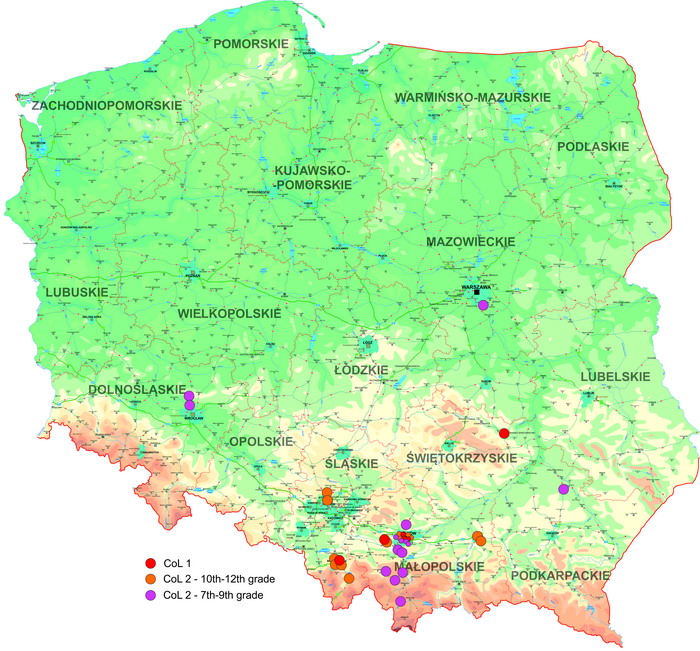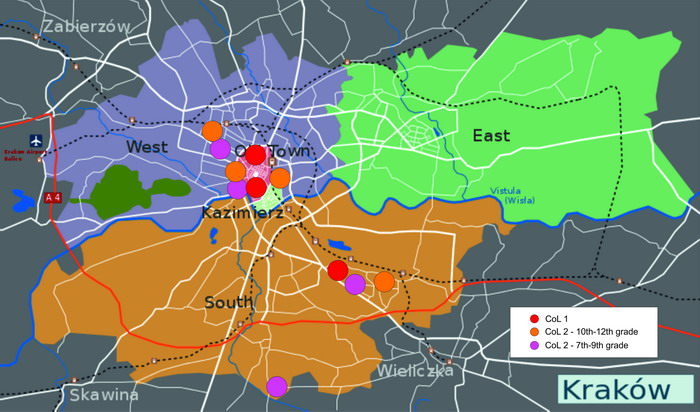In Poland, 29 science teachers (especially chemistry teachers) decided to participate in the second phase of the Community of Learners’ activity. Contrary to what has been expected, they do not teach in Krakow only, but also in a number of smaller and larger towns and cities of southern and even central Poland. Each month, five small CoL2 groups meet in Krakow, and one in Bielsko-Biala city. In total, in the second phase of the project approx. 750 lower secondary, upper secondary and technical secondary school students have been involved.
Teachers have chosen three modules to implement: group 1 – Polish module (catalysis), group 2 and 3 – Turkish module (nanosilver in healthcare), groups 4-6 – Greek module (use of nanomaterials). Most groups started their classes in November.
The students selected some institutions that they would like to visit, as well as scientists dealing with nanoscience. The list included for example:
- Professor A. Sechman, PhD, Eng., Department of Physiology and Endocrinology Animal, University of Agriculture, Krakow;
- Dr. R. Kurczab, Institute of Chemistry, State Higher Vocational School in Tarnow;
- Dr. M. Oćwieja, and Dr. R. R. Socha, Institute of Catalysis and Surface Chemistry PAS, Krakow;
- Research and Education Centre of Microelectronics and Nanotechnology of the University of Rzeszow;
- Dr. M. Wesołowska, Podhale State Higher Vocational School in Nowy Targ;
- Professor Cz. Kapusta, PhD, Department of Solid State Physics, AGH University of Science and Technology;
- Professor J. Adamowski, PhD, Institute of Physics and Applied Computer Science, AGH University of Science and Technology;
- M. Czapkiewicz, PhD, Department of Electronics, Faculty of Computer Science, Electronics and Telecommunications, AGH University of Science and Technology;
- Polymers and Biomaterials Nanotechnology Team of the Faculty of Chemistry, Jagiellonian University.
During their visit to the University in Bielsko-Biala, students attended the lecture by Dr. Eng. Richard Fryczkowski, entitled "All About Nano," while Professor Bożena Mrowiec, introduced them to the topic of "Nanosilver". Dr Ryszard Szumniak (Medical University of Silesia in Katowice), during his meeting with students talked about the dilemmas and scope of the difficulties encountered by the doctors performing world-famous face transplants in Gliwice. Dr. Michał Węgrzyn (the Institute of Botany) and Dr. Piotr Klepacki (the Botanic Garden of the JU) drew attention to the importance of responsibility and ethics in scientific research; a lot of substances that are products of plants may have both healing and toxic or addictive properties.
All groups participated as well in museum workshop conducted by Dr. Maciej Kluza in the Jagiellonian University Museum. Each school is planning an on-site exhibition of students’ interactive exhibits and preparing one exhibit for the joint exhibition entitled "Welcome to the Nanoworld,” which will be opened on May 18.










